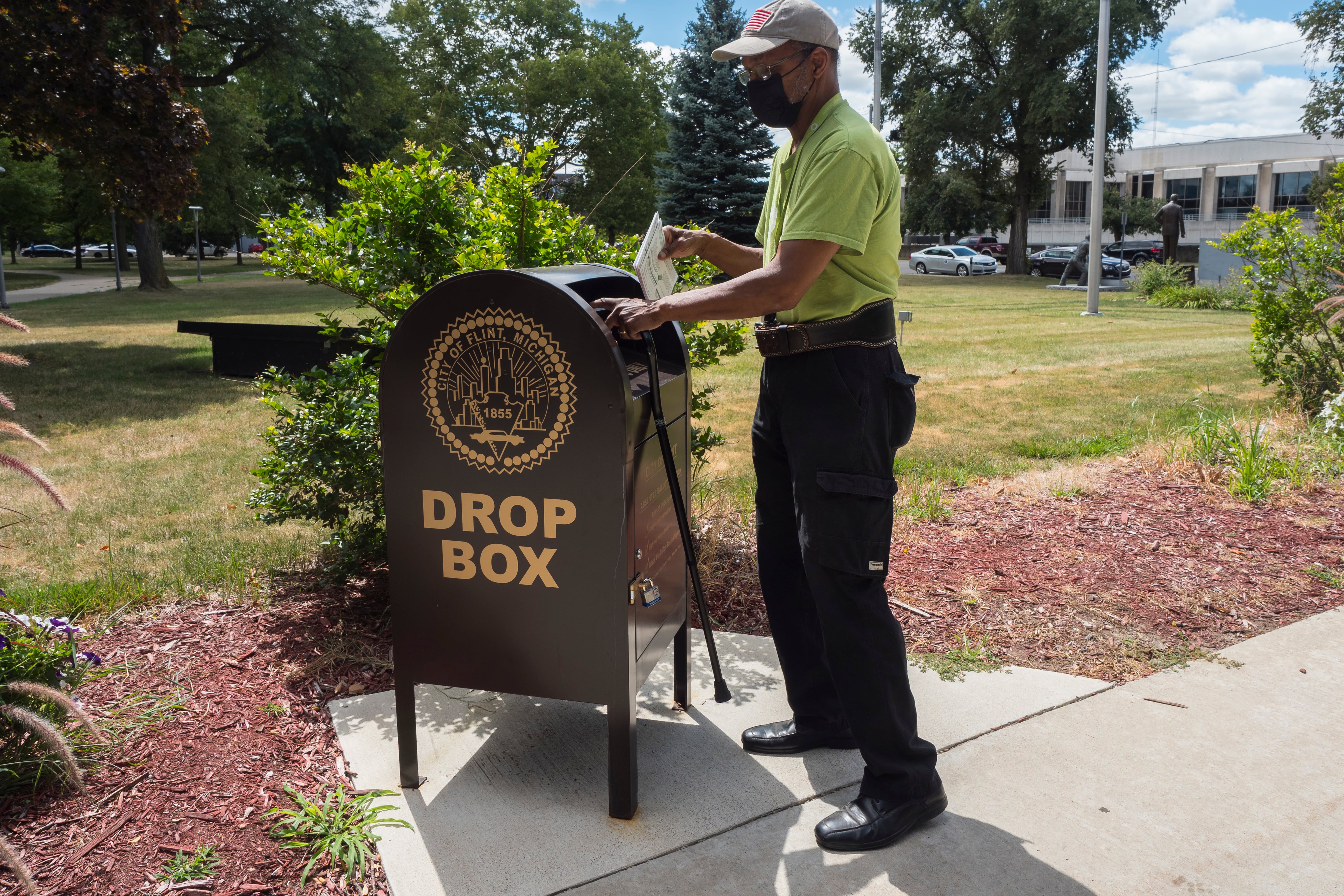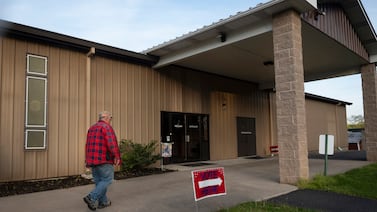Votebeat is a nonprofit news organization reporting on voting access and election administration across the U.S.
A hearing on legislation to ban guns within 100 feet of the entrance to polling sites and drop boxes brought out emotional and passionate testimony Tuesday from both supporters of the bill and gun-rights advocates in the wake of February’s deadly mass shooting at Michigan State University.
Clerks from East Lansing and Detroit tearfully told state lawmakers that a ban is needed to protect election workers and the public.
Marie Wicks, the interim city clerk for East Lansing, told lawmakers the Michigan State shooting in her city has left her “struggling to process” the tragedy. She oversees five off-campus precincts that have a heavy student presence, and said she is concerned how MSU students going to vote would react to seeing a weapon at a polling site.
“I cannot fathom how triggering for them a weapon would be in a polling location and quite possibly for many others including … past victims of gun violence,” Wicks said Tuesday.
The current atmosphere of threats and harassment, she said, have made it difficult to attract and retain clerks and election workers.
Asked about her opposition to guns near polling places, Wicks responded, “It doesn’t require a gun to vote.”
During her testimony in support of a ban, Detroit City Clerk Janice Winfrey told lawmakers of being personally threatened after the 2020 election, including receiving insulting and threatening messages on her private cell phone.
The “greatest threat,” she said, came one morning while taking a walk through her neighborhood. Winfrey said she was approached by a man about the results of the 2020 election.
“ ‘I’ve been waiting for you at work, so I decided to come to your house,’ ” Winfrey testified the man told her. “ ‘Why did you cheat and why did you allow Trump to lose? You’re going to pay dearly for your actions in this election.’ Mind you he was approaching me in a threatening manner and coming closer and closer.”
Winfrey said she later received a Facebook message from the man, who wrote that he was “going to blow up my block,” and that the man also started calling her names. She notified police, prompting police patrols in her neighborhood.
Michigan Rep. Penelope Tsernoglou, a Democrat and the chair of the House Elections Committee, is one of the sponsors of a package of bills aimed at protecting voters and election workers from harassment and intimidation. Democrats now hold the majority in the House and Senate, and are confident the bill has enough support to pass a committee vote.
Tsernoglu said at the hearing that the legislation, House Bill 4127, would ban firearms within 100 feet of the entrance of polling places or early-voting sites and drop boxes for absentee ballots during elections. The penalty would be up to 90 days’ imprisonment and/or a $100 fine, and the bill has no exception for gun owners with a concealed carry permit.
The lawmaker said harassment and threats of violence against election workers remain a chief concern.
“Some workers felt the need to hire security, flee their homes or seek counseling for their children for threats they have received,” said Tsernaglou. In addition, she said, more than 1,000 threats against election workers over recent election cycles are being investigated by the U.S. Department of Justice and the Federal Bureau of Investigation.
The fear of threats of violence is so bad, said Tsernaglou, that some election officials said they will not work during the 2024 elections, causing a “critical shortage” of election workers.
Democratic Rep. Stephanie Young is sponsoring a companion bill, HB 4128, aimed at protecting workers at locations where absentee ballots are processed and counted.
Young noted that election workers at the TCF Center in downtown Detroit, now Huntington Place, were in fear for their lives during the November 2020 election when mobs of protestors shook doors and threatened to storm the area where workers were counting ballots.
“Whenever someone exercises their right to vote, it should be inherent that they’re safe when they do that. It should also be inherent that election workers are just as safe and not under the pressure or the anxiety of intimidation,” Young said.
For Brenden Boudreau, the executive director for Great Lakes Gun Rights, a ban on guns near polling sites would be “dangerous.”
“These laws are very restrictive,” Boudreau said during his testimony Tuesday. “ [Gun carry laws] in Michigan are already pretty restrictive.”
Michigan bans guns in many places that typically serve as polling sites, including schools, churches, and sports arenas. Currently, 12 states and Washington, D.C., have bans on guns at polling places, according to the National Conference of State Legislatures.
Guns around drop boxes became a particular concern during the 2022 election in Arizona, after reports of armed observers watching voters using drop boxes in Maricopa County.
In a press release Monday, Boudreau called the proposal “an affront to the Second Amendment rights of law-abiding Michiganders” and “a solution in search of a problem.”
Brady Schickinger, executive director of the Michigan Coalition for Responsible Gun Owners, testified that while his organization agrees with the “general intent of the bill that everyone should feel safe while voting,” the bill could potentially punish responsible gun owners with a misdemeanor charge for carrying a firearm near a polling place.
Schickinger said some polling sites and drop boxes are located near busy roads, businesses, and public sidewalks, which could potentially make Michigan’s 800,000 concealed-carry permit holders open to criminal offenses.
“This bill would result in the hundreds of thousands of people routinely committing 90-day misdemeanors,” Schickinger said Tuesday.
Republican state Rep. Rachelle Smit, also a member of the House Elections Committee, asked about such a ban possibly violating the constitutional right of people with permits to carry concealed handguns if the proposed legislation becomes law.
Secretary of State Jocelyn Benson, a Democrat, lobbied for a gun ban at polling places shortly after the MSU shooting in East Lansing, where three students were killed and five others were wounded.
“The time for only thoughts and prayers is over,” said Benson in a Feb. 16 press release. The secretary of state noted that many other states, including Georgia, already ban guns in polling places.
Benson sought a gun ban at polling places in 2020 but was rebuffed by a judge
Benson’s request for the new restriction was part of a larger proposal for new laws called the Michigan Voting Rights Act, which she said will “mirror and expand upon” constitutional protections Michigan voters approved in November through Ballot Proposal 2.
Another hearing on the proposed ban is expected to be held before the House Elections Committee, but has not yet been scheduled.
Oralandar Brand-Williams is a senior reporter for Votebeat. Contact Oralandar at obrand-williams@votebeat.org.





